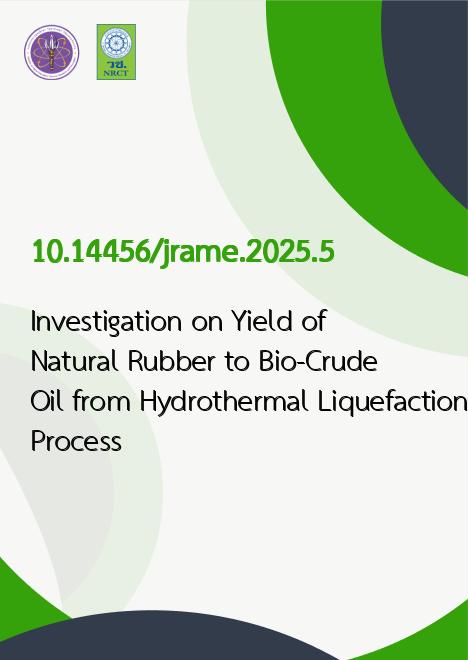
|
Investigation on Yield of Natural Rubber to Bio-Crude Oil from Hydrothermal Liquefaction Process |
|---|---|
| รหัสดีโอไอ | |
| Creator | 1. V. Phoncharoen 2. K. Pianthong |
| Title | Investigation on Yield of Natural Rubber to Bio-Crude Oil from Hydrothermal Liquefaction Process |
| Publisher | Thai Society of Mechanical Engineers (TSME) |
| Publication Year | 2568 |
| Journal Title | Journal of Research and Applications in Mechanical Engineering (JRAME) |
| Journal Vol. | 13 |
| Journal No. | 1 |
| Page no. | JRAME-25-13-005 (p.1-10) |
| Keyword | Hydrothermal liquefaction, Raw natural rubber, Bio-crude oil |
| URL Website | https://ph01.tci-thaijo.org/index.php/jrame/index |
| Website title | Journal of Research and Applications in Mechanical Engineering (JRAME) |
| ISSN | 2229-2152 |
| Abstract | Hydrothermal liquefaction (HTL) requires the presence of water and potentially some catalyst to convert biomass straight to bio-crude oil. In this study, the raw natural rubber is converted to bio-crude oil by the hydrothermal liquefaction process. Experiments are conducted in the autoclave reactor sized of 100 mL at various temperatures ranged between 325-400 ?C, with water to natural rubber mass ratios of 1:1 to 5:1, and reacting times of 30-75 minutes. From the investigation, it was found that the highest bio-crude oil yield of 71.4 wt% can be obtained at temperatures of 350 ?C, water to natural rubber mass ratios of 4:1, and reacting time of 60 minutes. From the Fourier transform infrared spectroscopy analysis, the major components of the bio-crude oil compound contain high carbon and hydrogen contents which are similar to fossil crude oil in generals. Therefore, it is suggested the synthesis of liquid fuel by the liquefaction process of natural rubber in Thailand is feasible and could be one of the energy potential in the near future. |
